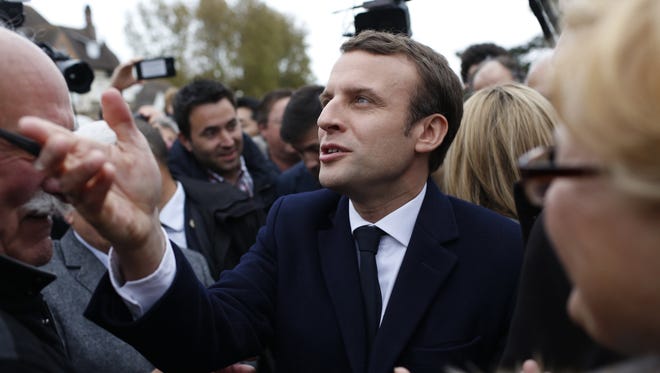Le Pen and Macron: Candidates vying to be France's next president
France moved one step closer Sunday to electing a new president after a far-right nationalist and a youthful former banker appeared to beat out nine other candidates to make it into the second round of the country's presidential election. The runoff is May 7.
The result sets up a clash between Marine Le Pen, 48, and Emmanuel Macron, 39, — two candidates with radically different views about France's position and role in the world.
Emmanuel Macron, On the Move

Macron has never held elected office and is married to a former teacher 20 years his senior.
If elected next month, a scenario surveys show is highly likely, he would be France's youngest president.
The former investment banker was France's economy minister, but quit incumbent President Francois Hollande's Socialist government to run for office as an independent.
The business-friendly challenger has emerged from relative obscurity to adopt a centrist position viewed as a liberal alternative to Le Pen, and a break from France's traditional left or right political leadership.
"A Macron victory would break the political mould of the Fifth Republic. Since 1958 France has been ruled by presidents who hail from the mainstream parties of left or right," said Charles Grant, director of the Center for European Reform, a think tank.
Macron wants to invest in public health and infrastructure, cut corporate tax rates and modernize workplace rules in a country that cherishes its time off. The "Macron Law" is a bill he introduced as economy minister that allowed more stores to open on Sundays.
His victory would represent a repudiation of a continent-wide backlash against Muslim immigration and European unity.
"The surge of support for Emmanuel Macron in France shows that liberal, pro-EU centrists may yet have a future in European politics. This would be good for the EU," Grant said.
France's political establishment have rushed to endorse Macron in the wake of the result. Failed Conservative candidate Francois Fillon said he would vote for Macron because Le Pen would "bankrupt France."
Marine Le Pen, National Front

Le Pen took control of the far-right National Front Party from her father Jean-Marie Le Pen in 2011 and epitomizes Europe's anti-European and anti-immigration attitude.
Le Pen is a lawyer who has worked to soften the party's image following her father's strident rhetoric.
The telegenic, twice-divorced mother of three children lives in the Paris suburbs. Her calls to forcibly expel illegal immigrants, close mosques linked to extremists and pull France out of the EU resonate with many middle class and rural voters.
Le Pen wants to ban all visible religious symbols worn in public, including Muslim headscarves and Jewish Kippahs. She believes globalization and international organizations such as NATO and the International Monetary Fund have undermined the nation-state.
Le Pen has been dogged for months by an anti-corruption probe into allegations that she improperly used EU funds to pay her personal assistant and bodyguard for jobs in France. She has denied breaking any rules and refused to submit to questioning until after the election.
Le Pen helped her party achieve its previous best-ever showing in a presidential election when the National Front came in third in the first round of 2012's vote.
She hailed Sunday's result for her party as historic and vowed to be a "great alternative" for the French people.
